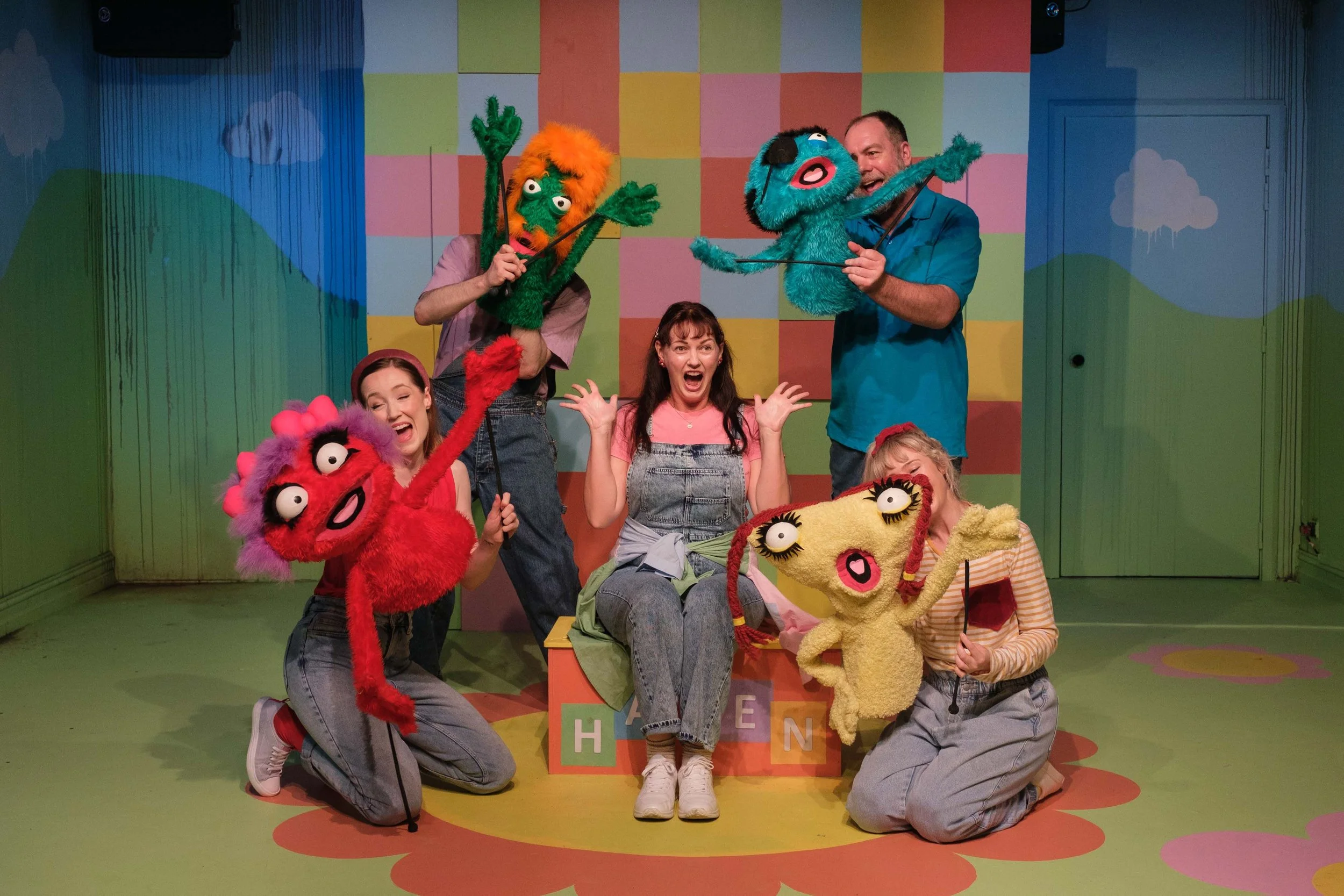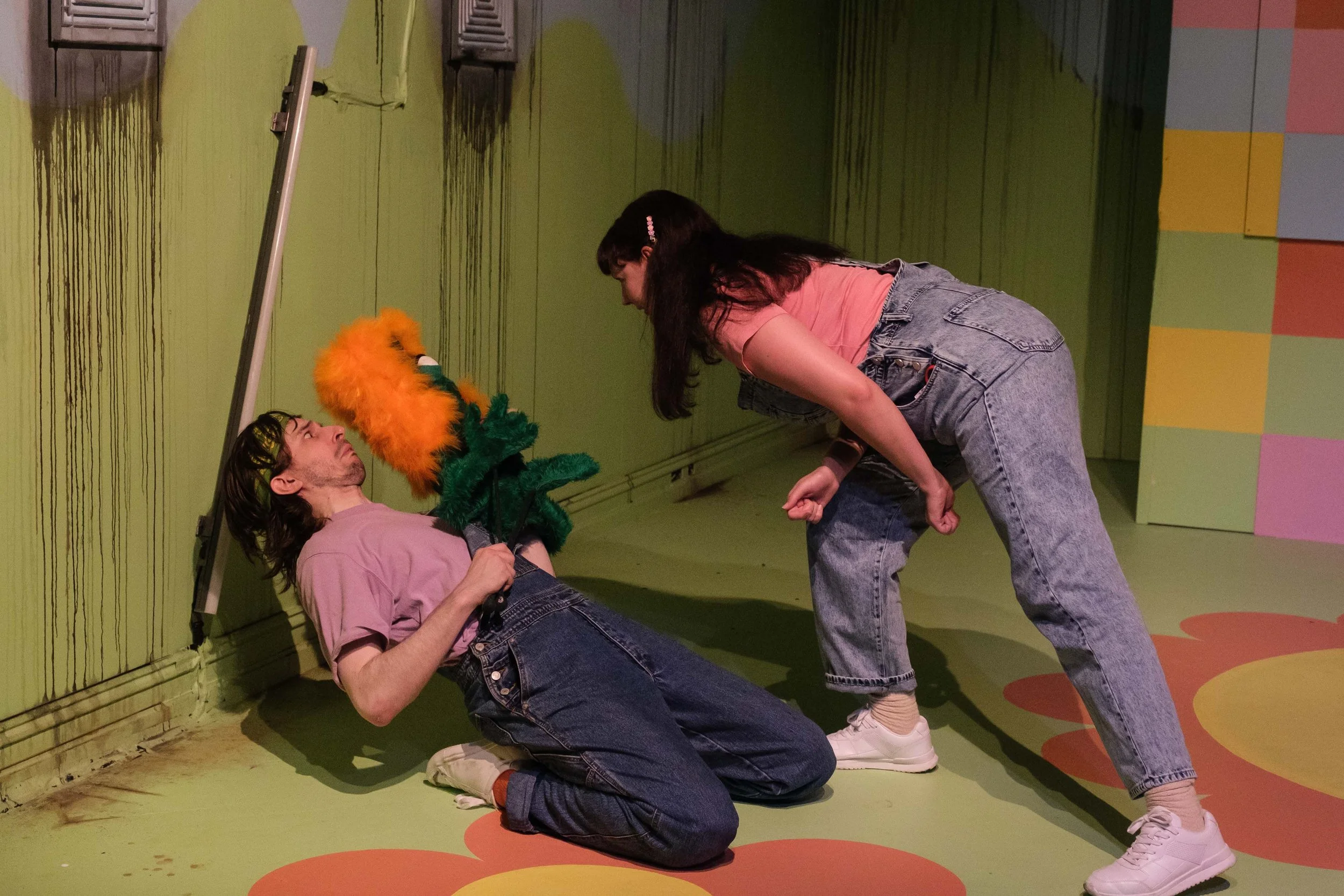Review: Apocka-wocka-lockalypse reaches beyond the fuzzy wuzzy puppet sillies
Written and directed by Richard Hilliar, presented by Tooth and Sinew
Review by Charlotte Smee
What do you get when you combine some fuzzy puppets, a deranged Play School host and a bunker in the endless post-apocalyptic Deadlands formerly known as Parramatta?
A surprisingly nuanced, and unsurprisingly hysterical, depiction of very much human desperation in the face of climate collapse. Or, that play I won’t shut up about called Apocka-wocka-lockalypse.
Miss Melissa (Nicole Wineberg) has saved four little monsters from certain doom after the climate collapse by letting them bunk with her in “Haven” – the happiest bunker on Earth. Schnerk (Nathan Porteus) is a blue friend with an eyepatch, Blurkina (Zoe Crawford) is a red neat-freak with pink bows on her head, Glorbo (a dopey Matt Abotomey) is a cylindrical green silly-billy and Titzi (the fabulously toddler-ish Lib Campbell) is a yellow weirdo who is obsessed with pools. The monsters are so grateful for Miss Melissa, because she is eerily kind and upbeat, but also because she is literally the hand that feeds them. That’s their only problem with being puppets – they aren’t dextrous enough to look after themselves.
With an ingenious combination of songs, lessons and storybooks, Miss Melissa’s facade of kindness is quickly revealed to be a disturbing relationship of control over the monsters – feeding them propaganda about the “time of too much, and not enough” and encouraging them to thank her for everything she constantly does for them so they can escape on the “Last Chance Plane” together. When Glorbo stops paying Miss Melissa his bedtime visits, and Titzi decides her favourite thing isn’t Miss Melissa, she starts to teach them increasingly horrific lessons about the “consequences” when there isn’t enough water and food to go around.
Production design by Ash Bell, in tandem with sound by Alexander Lee-Rekers and lighting by Isobel Morrissey, creates a pastel-chequerboard Haven with hints of the horror to come. Between the white fluffy clouds and pastel-coloured flowers, there are vents leaking a strange, black substance and strips of fluorescent light that turn red when something goes wrong. Buzzing sounds hum underneath the action, and the sound effects when Melissa has a lesson to teach are at once cute and terrifying. The puppets themselves are a sight to behold, with wonderfully garish colours and understated matching costumes for their humans.
The best thing about theatre, and puppets, is that they aren’t real. This means that they can, and should, create new rules for the way that stories are told. Puppets can’t make faces, raise their eyebrows, or even really talk. The success of puppets as characters in Sesame Street, Play School and The Muppets, depends on the enthusiasm of their performers, plus a sense of excitement and a suspension of disbelief from kids (and adults) in order to teach them sneaky lessons about emotions, relationships and the world. Hard things are easier to talk about if they aren’t in a familiar setting, and cute, fluffy things tug on our heartstrings on a level that’s deeper than our conscious brain, which is why I sob so hard every time I watch Big Bird find out that Mr Hooper won’t be coming back to Sesame Street anymore.
Richard Hilliar takes this idea of sneaky puppet lessons and twists it into a reflection of our adult, insane selves: what happens when we just can’t break out of the patterns we’ve made? How will we create a new world when we are just careening towards our inevitable end? Maybe we won’t turn into puppets (in the literal sense), but we have already started to look pretty silly.
Adults-only puppet shows aren’t new, with shows like Avenue Q, Team America and even the web-series-turned-tv-show Don’t Hug Me I’m Scared using the fucked-up kids’ show structure to satirise their child-friendly counterparts and garner shocked guffaws from their audiences. Apocka-wocka-lockalypse is different. Although it borrows from its puppet art friends by using perfectly placed swear words to shock us into laughing, it also manages to tell a story that leaves its audience in an uneasy silence. Blurkina, for example, struggles in song to reconcile with having a child during times of crisis, and her love story with Glorbo is just as tragic as any serious play could have. The childish repetition of the kids' show is used to turn the seemingly throwaway jokes into something more sophisticated and sinister.
Apocka-wocka-lockalypse also uses audience participation in subtle, clever ways, with Miss Melissa teaching us how to make a concertina fan and asking us if we’re sitting comfortably, while the monsters ask us to help them pick up the eyes of other, murdered monsters, or read out the message that spells their doom. The final moment of audience participation demonstrates, in no uncertain terms, the line we draw for ourselves between “appropriate” and “inappropriate” participation. It asks us, through a quickly deteriorating puppet world, how much action we’re willing to take, or if we’re just here to watch ourselves repeat our mistakes over and over again.
A perfect example of childish comedy being used to talk about very adult, difficult issues, Apocka-wocka-lockalypse is as much smart as it is fun to watch. Full of colour, ridiculousness, and sneaky political messaging (everything I’m always searching for at the theatre), you’d be apocka-wocka-ludicrous to miss Tooth and Sinew’s latest 90 minutes of insanity.
A special mention must also go to their marketing, which is almost as hilarious as the show is. Find it on Tooth and Sinew’s Instagram page.
Apocka-wocka-lockalypse plays at the Meraki Arts Bar until 1 April. Find tickets here.
Production images by Clare Hawley, collage by Ceridwen Bush
Charlotte is the editor of Kaleidoscope Arts Journal, a little enby and a big mess. Their friends regularly worry that they might overdose on theatre.
Like what we do? Subscribe to our Patreon here.


